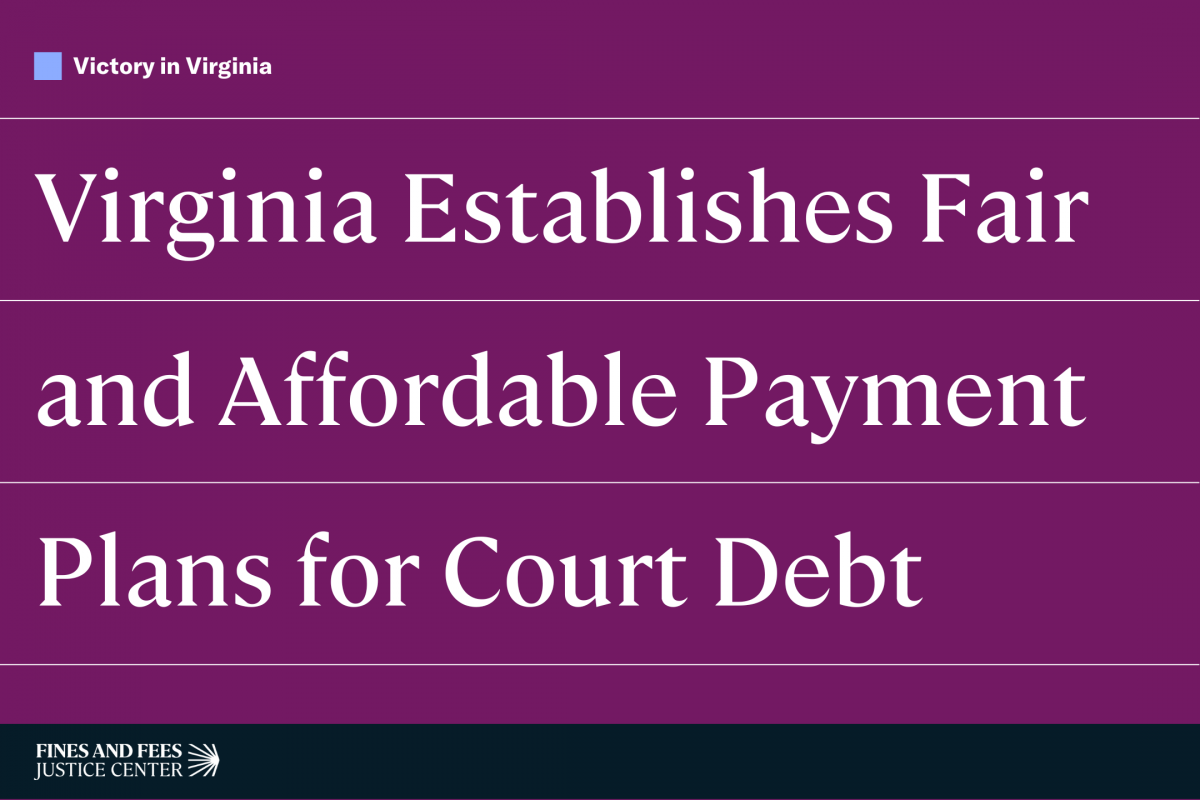Richmond, VA – On Monday, March 24th, Governor Glenn Youngkin signed HB 1661 into law, establishing a fair and consistent payment plan system for Virginians that have been struggling to pay down court debt. The new law establishes flexible monthly payment plans for court debt in all 120 jurisdictions across the Commonwealth, helping ensure that any Virginian who owes court debt is treated more equitably and fairly by the court.
With leadership from Chief Patron Delegate Michael Jones, HB 1661 passed through the General Assembly with strong bipartisan support — a testament to tireless advocacy efforts from people with lived experience, fine and fee reform advocates, and policymakers on both sides of the aisle.
“The passage of HB1661 marks a significant stride towards economic justice,” said Chief Patron Jones. “This bill addresses the systemic issues that perpetuate cycles of poverty and recognizes that excessive fines and fees have disproportionately affected vulnerable communities, often trapping individuals in financial hardship. HB1661 represents our commitment to fairness and dignity for all citizens, regardless of their economic status. It’s a crucial step in ensuring that our justice system does not unduly burden those least able to bear the weight of financial penalties.”
“HB1661 is an important step in supporting returning citizens and their ability to pay court costs in a fair manner. I was proud to support this commonsense, bipartisan bill” said Chief Co-Patron Delegate Cherry.
The new law establishes a minimum monthly payment of $25 for all court jurisdictions and allows people with demonstrated financial hardship to pay lower monthly minimums. Currently, payment plan rules vary widely — and while so many of those plans create insurmountable hardship, the depth of that hardship depends entirely on your zip code. Of the 44 jurisdictions with minimum amounts listed, 41% had minimum payment options of at least $100 per month.
“The best thing we can do for our communities, families, and returning citizens is to make it easier for people to thrive rather than get caught up in things that set us all back,” said Taj Mahon-Haft, Director of The Humanization Project. “Allowing people to stay on track while making minimum payments they can actually afford, wherever they live in Virginia, does just that. It ensures fewer people have to choose between paying for groceries and health care or paying off court debt.
Virginia’s cost of living now exceeds $50,000 per year for adults without dependents—higher than the state’s median income for a single earner. When income trails behind expenses, even monthly payments that might seem nominal for some become almost impossible for many without forgoing basic, essential needs.
“Ensuring that people coming out of incarceration have access to a universal payment plan for court fines isn’t just about financial fairness—it’s about giving people a real chance to rebuild their lives,” said Karen Grant, Project Coordinator for REAL Life Recovery who is currently enrolled in a court debt payment plan. “Too often, the burden of fines and fees pushes people back into cycles of hardship and even relapse. A universal payment plan allows individuals to take responsibility in a way that’s manageable, giving them the opportunity to focus on employment, stability, and becoming positive contributors to their communities. This isn’t just good policy—it’s a necessary step toward true rehabilitation and second chances.”
This victory was spearheaded by the Humanization Project, with strong support from Fines and Fees Justice Center, and partners like Legal Aid Justice Center, New Virginia Majority, and The Commonwealth Institute, and the fearless directly impacted advocates who shared their first-hand experiences with legislators.
“Many Virginians with court debt are struggling to make ends meet. This new law marks an important step forward towards recognizing that,” said Pat Levy-Lavelle, Senior Intake Attorney at Legal Aid Justice Center. “When payment plan policies consider a person’s limited or inability to pay, Virginia benefits. Realistic expectations — whether small payments or no payments based on resources — help Virginians stay on track, avoid hardship to their families, and move on as members of our community.”
Virginia’s move to make these payment plans equitable and accessible is a meaningful victory for the nearly 1.2 million Virginians who earn less than $50,000 per year, any one of whom might be saddled with insurmountable court debt at some point in their life. It is also a major win for the broader national fines and fees reform movement.
“Every day, we are fighting for people whose lives, families, and communities have been devastated by fines, fees, and onerous collections practices in the criminal legal system,” said Emily King, Virginia resident and Senior Advocacy and Campaigns Strategist at Fines and Fees Justice Center. “HB1661 is a critical step forward in this work, and the bipartisan effort shown this year demonstrates the momentum towards future, long-term, meaningful reform for fines and fees in Virginia. We are just getting started.”
